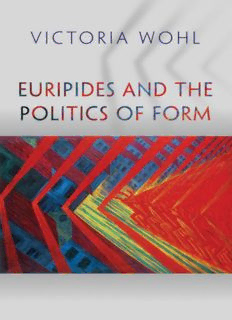
Euripides and the Politics of Form PDF
Preview Euripides and the Politics of Form
Euripides and the Politics of Form • Martin Classical Lectures The Martin Classical Lectures are delivered annually at Oberlin College through a foundation established by his many friends in honor of Charles Beebe Martin, for forty- five years a teacher of classical literature and classical art at Oberlin. John Peradotto, Man in the Middle Voice: Name and Narration in the Odyssey Martha C. Nussbaum, The Therapy of Desire: Theory and Practice in Hel- lenistic Ethics Josiah Ober, Political Dissent in Democratic Athens: Intellectual Critics of Popular Rule Anne Carson, Economy of the Unlost: (Reading Simonides of Keos with Paul Celan) Helene P. Foley, Female Acts in Greek Tragedy Mark W. Edwards, Sound, Sense, and Rhythm: Listening to Greek and Latin Poetry Michael C. J. Putnam, Poetic Interplay: Catullus and Horace Julia Haig Gaisser, The Fortunes of Apuleius and the Golden Ass: A Study in Transmission and Reception Kenneth J. Reckford, Recognizing Persius Leslie Kurke, Aesopic Conversations: Popular Tradition, Cultural Dialogue, and the Invention of Greek Prose Erich Gruen, Rethinking the Other in Antiquity Simon Goldhill, Victorian Culture and Classical Antiquity: Art, Opera, Fic- tion, and the Proclamation of Modernity Victoria Wohl, Euripides and the Politics of Form Euripides and the Politics of Form • Victoria Wohl Princeton University Press Princeton and Oxford Copyright © 2015 by Trustees of Oberlin College Requests for permission to reproduce material from this work should be sent to Permissions, Princeton University Press Published by PrincetonUniversity Press, 41 William Street, Princeton, New Jersey 08540 In the United Kingdom: PrincetonUniversity Press, 6 Oxford Street, Woodstock, Oxfordshire OX20 1TW press.princeton.edu Jacket art: Luigi Russolo, (1885–1947), The Revolt, 1911 (oil on canvas), Haags Gemeentemuseum, The Hague, Netherlands / Bridgeman Images All Rights Reserved Library of Congress Cataloging-in-Publication Data Wohl, Victoria, 1966– author. Euripides and the politics of form / Victoria Wohl. pages cm—(Martin classical lectures) ISBN 978-0-691-16650-6 (alk. paper) 1. Euripides—Criticism and interpretation. I. Title. II. Series: Martin classical lectures. PA3978.W64 2015 882ʹ.01–dc23 2014036247 British Library Cataloging- in- Publication Data is available This book has been composed in Baskerville 10 Pro Printed on acid- free paper. ∞ Printed in the United States of America 10 9 8 7 6 5 4 3 2 1 For MG • C ontents • Preface ix Acknowledgments xv Introduction. The Politics of Form 1 Chapter 1. Dramatic Means and Ideological Ends 19 Chapter 2. Beautiful Tears 39 Chapter 3. Recognition and Realism 63 Chapter 4. The Politics of Political Allegory 89 Chapter 5. Broken Plays for a Broken World 110 Conclusion. Content of the Form 132 Notes 143 Bibliography 171 Index 193 P refaCe • Let me begin by explaining my title. First, Euripides. This is not really a book about Euripides. It doesn’t treat all his plays or offer a synthetic analysis of their characteristic features; nor does it provide exhaustive readings of the plays it does treat. I do aim to shed light on Euripidean drama, to better understand what it is doing and how. But the book’s raison d’être, and my defense for adding to the enormous bibliography on the author, lies in the second half of the title. Euripides is offered as an illustration—not the only possible one, though not, of course, cho- sen completely at random—of an argument about the relation between politics and literary form. My definition of politics is both narrow and broad. It encompasses, on the one hand, the formal institutions and political practices, the class relations and power struggles, the communal decisions and ac- tions of the fifth- century Athenian democracy; and on the other hand, the ideological beliefs (collective and individual), the attitudes and at- tachments, the “structures of feeling” (in Raymond Williams’s phrase) that subtend the institutional structures of the polis. Drama operates more directly within the latter, the psychic and affective domain of ide- ology, but in doing so (as I hope to show) it can intervene actively in the former. Thus, while my title is meant as an allusion to Fredric Jame- son’s “ideology of form,” and a recognition of my methodological debt to his work, I chose the term “politics” in order to highlight the dimen- sion of the polis and to insist upon the possibility of drama’s real and material impact on the collective life of its citizens.1 By “form” I mean nothing particularly esoteric. Following Aristotle, I take the defining formal feature of drama to be its plot structure, the muthos. If tragedy is, as Aristotle defines it, a mimēsis of a praxis, an imi- tation of an action, the emplotment of that action is “dramatic sub- stance . . . in its formal dimension.”2 The structure of the plot—its inter- nal organization and the ligatures between its parts, its tempo and
Description: